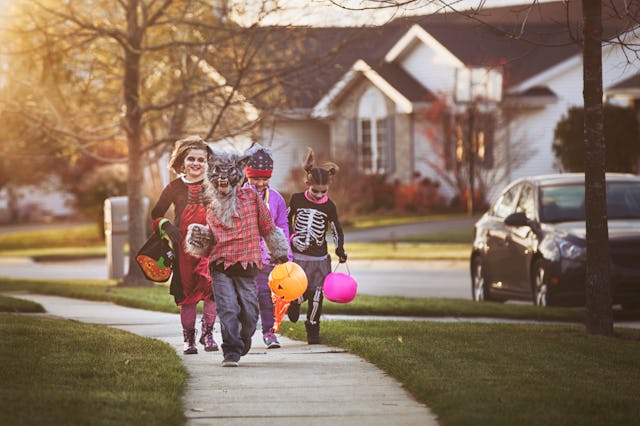Can A Scaredy Cat Kid Still Enjoy Halloween?
Two psychologists discuss how to deal when your kid is easily spooked.

You already know not to bring your anxious little one to a haunted house, or to induce nightmares in your kiddo by introducing them to horror movies. But what happens if your child displays hesitation, anxiety, or straight-up fear over standard Halloween fare, such as costumed kids at a party or trick-or-treating when it’s dark and (therefore) spooky outside?
Though Halloween is supposed to be a fun, fictional fantasy for kids of all ages, it’s actually incredibly common for kids to experience more tricks than treats. We talked to two psychologists who explained why your child might be suddenly spooked (even if they were fine last year) and how to navigate their fears and have a fun, tear-free holiday.
Fear Factor: When It Begins
Your little pumpkin might be afraid of Halloween well before they’re potty trained, explains Dr. Francyne Zeltser of Manhattan Psychology Group. “Parents of babies and young toddlers may see heightened stranger anxiety, which can peak as early as nine months and tends to persist throughout toddlerhood,” she says. “Halloween adds another layer to stranger anxiety because even familiar people can look unfamiliar in costume. Additionally, some costumes are meant to be scary so they add another dimension to ‘stranger danger.’”
Unfortunately, there are plenty of added variables for toddlers and school-aged kids, adds Dr. Lindsay Popilskis, a licensed psychologist at Pathways of Rockland County. “One of the issues for younger children (typically 3 to 6 years old) when it comes to decorations and seeing people in masks is that their imaginations at that age are really developing — at the same time, that active imagination may blur the boundary between reality and fantasy.”
“Being afraid of monsters or afraid of the dark are heightened during Halloween due to the intentional fear provoking stimuli often associated with Halloween,” notes Zeltser, citing scary music, costumes, decorations, behavior (such as jumping out and scaring), and the like. Also for this age group, “there may be some separation anxiety, when children are expected to ring doorbells or participate in costume parades without their parents next to them,” she adds.
How To Prepare Before The Big Night
“If your child appears apprehensive to participate in Halloween festivities, do not fret,” says Popilskis. “Many children — especially younger children — misinterpret spooky costumes and themes as realistic terror.”
“First and foremost, never shame or ignore your child’s fears,” she says, noting that parents and caregivers are their kids’ guides for making sense of the (sometimes scary) world around them.
Popilskis says that some kids might be afraid of the more fantasy-oriented stuff, such as zombies and monsters, while other kids might be afraid of realistic-looking things like skeleton bones and fake blood. “Or perhaps your child's fears and anxiety are more related to the social aspect of Halloween, such as being in a group while trick-or-treating or knocking on the doors of potential strangers to ask for candy,” she adds. So get specific with your child so you can understand where the fear comes from.
Ahead of Halloween, Zeltser suggests role-playing ‘trick-or-treating,’ calling it “a great way to prepare children for the big day and lessen fears. Start by practicing trick-or-treating at home by having kids knock on internal doors, with adults acting out the different ways (friendly, scary, mean, etc.) people may open their doors to greet trick-or-treaters.” You can even work with family and friends (i.e. neighbors) to practice trick-or-treating in more familiar environments with friendly faces.”
Both pros recommend listening to Halloween-themed soundtracks and/or songs, reading age-appropriate books or stories, carving or painting pumpkins, and watching non-scary movies and shows like It’s The Great Pumpkin, Charlie Brown, or Hocus Pocus with your kiddo, so you can help explain that it’s all pretend, says Popilskis. She also recommends decorating your home together with non-terrifying decorations, as well as picking out family-friendly group costumes based on your child’s favorite movie/book characters, team outfit, or community helper, which will help remind your child that all costumes and decorations are fake.
Even better, per Popilskis: offer to bring your kid to a Halloween store so they can see and touch various costumes and decorations up close, showing that Halloween items are “simply pretend replications of scarier concepts.”
Handling An Unexpected Catastrophe
Even if you slowly introduce your little one to Halloween and all its tricks and treats, they might have an unexpected freakout at a party, gathering, or trick-or-treating event. “If your child becomes afraid when they’re already at an event, take them aside to help avoid feelings of embarrassment as well as to hopefully pinpoint your child’s specific areas of concern,” says Popilskis. “The event may simply be too loud, or perhaps certain costumes and decorations evoke a fear response.”
Try something quieter or less frightening to do, such as passing out treats. “You can offer your child a responsibility, which may provide him or her some control of the surroundings. Singing familiar songs, sharing non-scary Halloween stories, or taking a walk outside may lighten the mood and keep your child’s fears at bay.”
Zeltser encourages telling your child they can “opt out” of any event or not stop at every house, especially those with scary decorations or costumed greeters. Validating their feelings by letting them know it’s OK to be scared, as well as staying close by to help them feel comforted, is a great idea, especially for younger kids, she says.
Of course, “If all else fails, children can always remain home, hand out candy to others, or even enjoy a Halloween treasure (candy) hunt around the house,” says Popilskis. There’s nothing wrong with enjoying a quiet, chill Halloween at home — someday, you’ll miss these moments spent with your little one, so enjoy them however you get them.
This article was originally published on